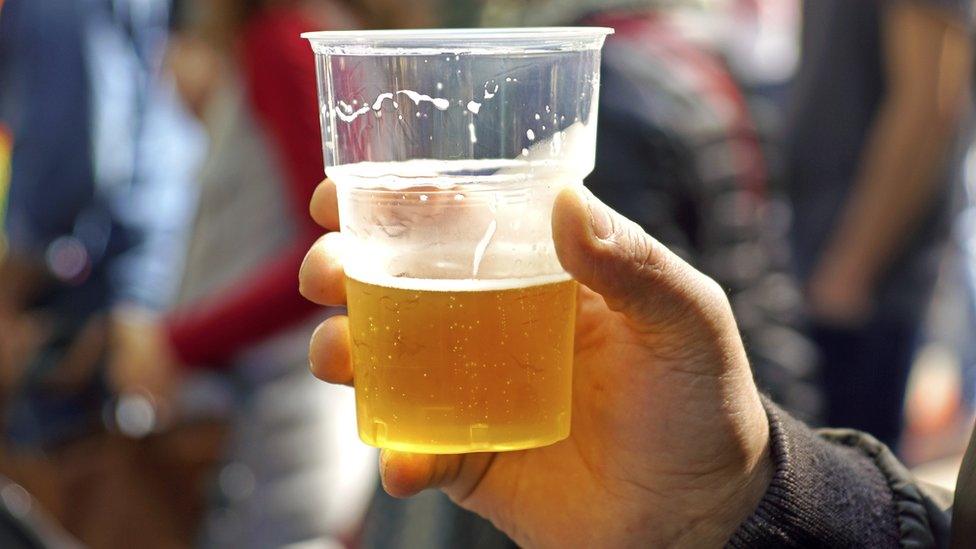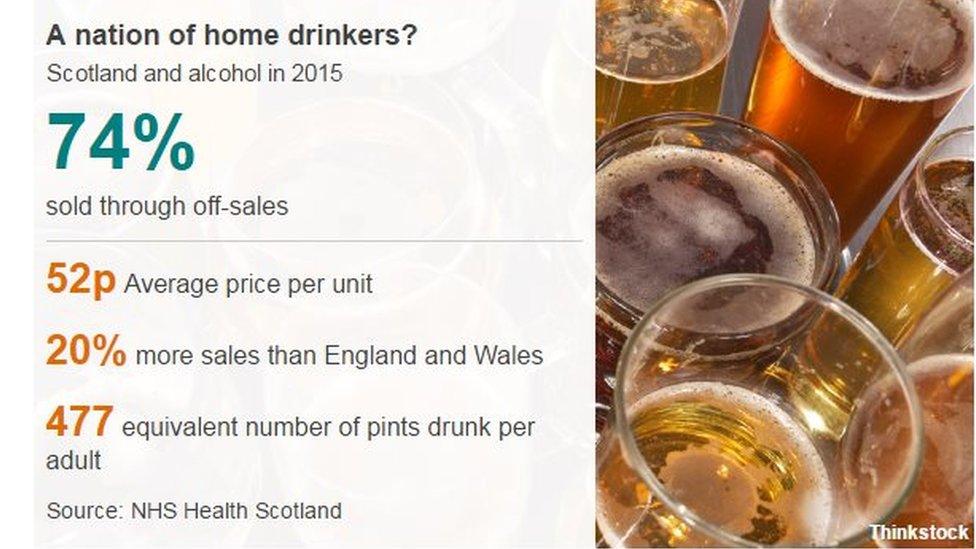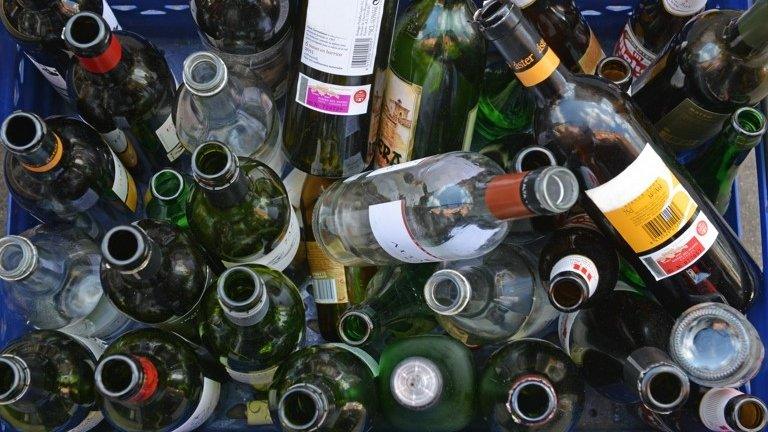Scotland now a 'nation of home drinkers'
- Published

Alcohol sales in Scotland were in decline but have now started to rise again
Adults in Scotland have increased their consumption of alcohol for the second year in a row, according to a report.
NHS Health Scotland said the trend was mainly down to more alcohol being bought in supermarkets and off-licences - particularly beer and wine.
Sales in 2015 were 20% higher in Scotland than they were in England and Wales, with each adult consuming the equivalent of 477 pints of beer.
Alcohol Focus Scotland said the country had become a "nation of home drinkers".
The Scottish government said the report supported the case for minimum pricing.
An earlier report in December 2014 found alcohol consumption in Scotland had fallen by the equivalent of 38 million pints of beer a year since 2009.
The decline was linked to the economy crashing and the scrapping of multi-buy deals.
But last year, the NHS said alcohol sales had begun to increase again.
Total sales were the equivalent to 41 bottles of vodka or 116 bottles of wine for each adult.

In recent years, the Scottish government has tried to crack down on Scotland's "unhealthy relationship with drink".
In December 2014 the Scottish government reduced the legal alcohol limit for driving from 80mg to 50mg in every 100ml of blood.
Experts said the new limit would mean that an average man would be limited to just under a pint of beer or a large glass of wine, and women to half a pint of beer or a small glass of wine.
The limit in England and Wales remains at 80mg.
Scottish government plans to introduce a minimum price for a unit of alcohol, passed in 2012, have run into trouble with European competition rules after a challenge from the Scotch Whisky Association.
Under the current plans of 50p per unit, the cheapest bottle of wine (9.4 units of alcohol) would be £4.69 and a four-pack of 500ml cans of 4% lager would cost at least £4.
It would mean a 70cl bottle of whisky could not be sold for less than £14.
In its latest analysis of Scottish drinking habits, researchers found that 74% of alcohol was sold through off sales - the highest market share since recording began in 1994.
The report concluded that the higher sales compared to England and Wales were mainly because of the sales of lower-priced alcohol in supermarkets and off-licences, particularly spirits.
More than twice as much vodka was sold in off-sales per adult in Scotland than in England and Wales.
The researchers also found that in 2015 the average price of a unit of alcohol sold through off-sales was 52p - a price that has not changed for two years.
Dr Mark Robinson, senior public health information manager at NHS Health Scotland, said the reversal in declining alcohol sales was "concerning".
"Between 2009 and 2013, the average price of alcohol increased and consumption decreased. Since 2013, average price has flattened and consumption has increased," he said.
"Higher levels of alcohol consumption result in higher levels of alcohol-related harm and these present a substantial public health and economic cost to Scotland."
Dr Robinson said reducing the availability of low priced, high-strength alcohol was the most effective way of reducing alcohol-related health issues.
About 22 people a week are dying in Scotland because of alcohol, according to the Scottish government.
Minister for Public Health Aileen Campbell said: "We remain absolutely committed to introducing minimum unit pricing and this report adds to the wealth of evidence which supports this policy.
"We also welcome the fact that the European courts have returned this matter to the Scottish courts for a final decision."
Cheap vodka
Alcohol Focus Scotland said minimum pricing was "desperately needed".
The organisation's chief executive, Alison Douglas, added: "The more affordable alcohol is, the more we drink, and this means more alcohol-related hospital admissions, crime and deaths.
"Politicians across the Scottish Parliament understood this evidence when they passed minimum unit pricing legislation four years ago.
"It is really disappointing that this life-saving measure has been delayed by the Scotch Whisky Association's legal challenge. Their defence of cheap vodka and cider is somewhat at odds with the 'iconic' image of Scotch."
The Scotch Whisky Association challenged the report, saying the Scottish government's own longer-term figures suggested a decline in alcohol-related harm in Scotland over the past decade.
The association's spokesman Graeme Littlejohn said: "More needs to be done to tackle alcohol-related harm and we look forward to working in partnership with the new Scottish government and others to continue that progress.
"Minimum pricing, however, is not the answer.
"The European Court of Justice's recent ruling made it clear that minimum pricing is a significant barrier to trade in breach of EU law, with research for the Scottish government showing that it would not reduce the number of people drinking at hazardous and harmful levels."
- Published26 August 2015

- Published8 December 2014
